At every age in life, drivers consider different components when looking for a new car. That is certainly the case for older drivers. Most in this demographic put a greater emphasis on factors such as visibility, safety features, easy-to-use systems and how comfortable it is to get in and out of the car. Or maybe, if they have recently retired, they decided it is time to finally splurge and get behind the wheel of their dream car. Whatever the situation, these are a few of the best cars for older drivers.
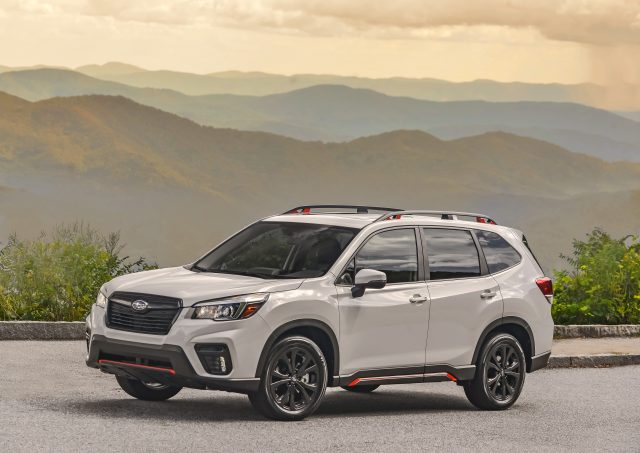
For The Practical Driver
MSRP: $25,895
MPG: 26 city / 33 highway
Crash Test: 5 stars
The Subaru Forester makes getting behind the wheel a cinch for older drivers – literally. Large doors and elevated seating allow for easy entrance and exit to and from the car. Once set to drive, the chair-like seating position coupled with big windows and thin pillars supply excellent driver visibility. The Forester’s climate and infotainment systems are straightforward and easy to use.
The Forester comes with a five-star crash test rating. Even better, Subaru has worked to significantly cut down on crashes thanks to EyeSight, the manufacturer’s driver assist technology. EyeSight works by equipping the car with dual color cameras near the rearview mirror. These cameras can monitor traffic movement, optimize cruise control and warn drivers if they sway outside the lane. EyeSight has been found to reduce rear-end crashes with injuries by up to 85%.
For The Traveler
MSRP: $29,590
MPG: 24 city / 29 highway
Crash Test: 4 stars
With your nine-to-five days behind them, retirees have much more free time – and much more free time to travel. Whether visiting the grandkids or checking off a destination on their bucket list, retirees need the right car for all their future adventures.
The Kia Sorento is a midsized SUV with all the prerequisites needed for older drivers: comfortable seating, simple controls and available safety technology. What makes it perfect for long trips is the large, quiet cabin, comfortable ride, ample storage space and, most importantly, above-average highway gas mileage for a SUV. Check out our list of the most fuel-efficient cars.
Also, the Sorrento’s third row of seating can be folded down if you need more storage space or up to hold passengers, in case they do happen to visit the grandchildren.
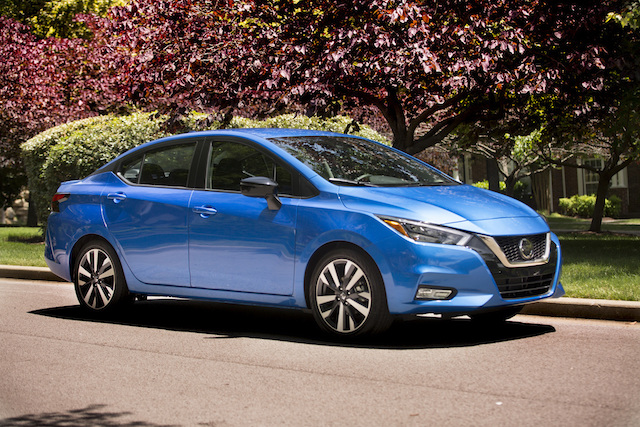
For The Frugal Consumer
MSRP: $15,380
MPG: 32 city / 40 highway
Crash Test: 5 stars
The Versa was completely redesigned for 2021 (goodbye manually operated crank windows!) The makeover gave the subcompact sedan more legroom than one would expect, up to 15 cubic space of cargo room and a 122-horsepower four-cylinder engine.
Safety is addressed with the Nissan Safety Shield® 360, a package of features including automatic emergency braking, lane-departure warning, and automatic high-beams. The entry-level Versa S sedan retains Bluetooth functionality, but lacks the Android Auto and Apple CarPlay integration you can find in higher trims.
But above all, what makes the Nissan Versa one of the best cars for older drivers — or any driver? The price. With a base price of under $15,000, you will be hard-pressed to find a better value.
Want to see more inexpensive cars? Here’s our list of the cheapest new cars of 2022.
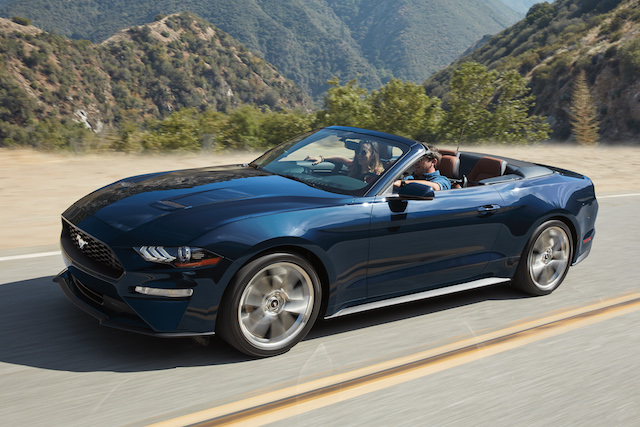
For The Dreamer
MSRP: $32,705
MPG: 20 city / 28 highway
Crash Test: N/A
Those recent retirees who waited to reach social security’s full benefit age (66) most likely started their driving career in the 1960s or early 70s. This era in automotive history was marked by the rise of muscle cars and there was no such car more popular than the Ford Mustang. Assuredly, many current retirees dreamed of getting behind the wheel of a Mustang. And if they weren’t able to then, now is the time. Finding a vintage Mustang may be challenging. Fortunately, the model is still going strong. In fact, it’s nearing its 60th anniversary.
While there are several model types to choose from, you can’t go wrong with a convertible. The Mustang Convertible EcoBoost models delivers 310 horsepower and gets 20/28 miles per gallon. And the powerful car still has a five-star safety rating thanks to features such as a Blind Spot Information System with Cross-Traffic Alert. The Mustang also comes standard with modern amenities like LED headlamps and lighting, active noise cancelation, six-speaker sound system, and leather wrapped steering wheel.
Save up for your dream car with banking and savings options from AAA.
For more car recommendations, check out our test drives.
AAA members get great rates and competitive terms when shopping through the AAA Auto Buying program. Learn more about our network of certified dealers and to start comparing vehicles today.
137 Thoughts on “Great Cars for Older Drivers and Retirees”
Leave A Comment
Comments are subject to moderation and may or may not be published at the editor’s discretion. Only comments that are relevant to the article and add value to the Your AAA community will be considered. Comments may be edited for clarity and length.



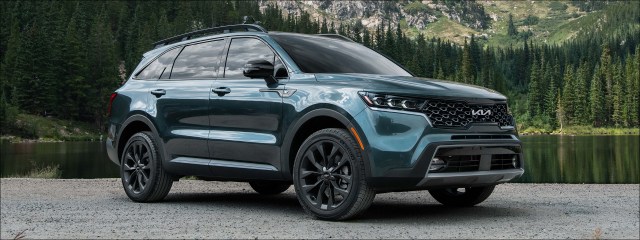







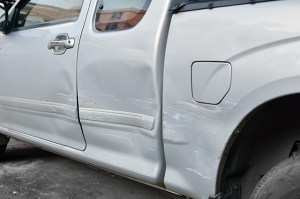
If you are 5 feet tall or less it’s very hard to find a vehicle like the Forester that you can just step down from. You always have to jump a few inches down to reach the ground which sometimes causes ankle problems. Sedans are good for this but you lose out on visibility. What’s the best car for an older short person?
We have a Toyota RAV 4 Ltd from 2011. My wife is 4’9” and it is perfect for her!
I’m just under 5′. My RAV4 is a 2002. I want an SUV the same size, so trying to hang on to it as long as i can lol. Everything’s gigantic, but I’ve seen some on the road that appear smaller, have to check them out (CX5 for example (Mazda???). I don’t want or need wider and longer but I still want to be up as high as my ol’ rav.
I have a 2016 Mazda CX 5! Hands down the best car I ever owned, and I have been through many!
I honestly did not want an SUV .. and tried them all because I am only 5’ 1
And it’s so comfortable, beautiful ride, 25 miles? Maybe more depends on my driving … try them all and you will know ) Best of Luck 🤞
Might look at the Subaru Impreza. It has 7 trim levels. Ground clearance 5.1 inches while the Subaru Forester ground clearances 8.7 inches. https://www.subaru.com/compare/trims.html?compare=IMP&year=2022&navSection=2022%20Impreza
The Land Rover Diesel
Good review for older drivers like me.
The Honda Fit will not be available in the US for 2021. It is available in other countries (likely as the Honda Jazz).
People are NOT TOLD that the STAR SAFETY ratings are ONLY APPLICABLE to other vehicles IN YOUR WEIGHT/SIZE CLASS! In other words……If a Honda Fit/Toyota Prius gets hit by a full size Nissan Maxima sedan…… GOOD LUCK! (never mind a Ford F150 Pick -up Truck!! The Number 1 sold vehicle in Country!)
I will NOT drive a Small vehicle. Get a few year old LARGER SEDAN/Mid size SUV! ( drive a bit slower to get 75% same MPG as a mini car) My LIFE is worth the extra $1500 a YEAR in Gas! My current car was $34K new. I bought for $25K used, w 50K miles! I feel safe!
My feelings exactly. Another voice of reason. Not to mention this is still a depreciating asset.
The new Jazz sold in South Africa now is, to my mind, the best looking one yet. I’ll bet if Honda changed the name of the Fit to Jazz in the US, sales would increase enough to keep it in the market here. I’ll never understand why Honda didn’t do that. I drove one in Cape Town for 10 years, and it was a superb not-so-little car. Passengers over six feet tall were amazed at the rear seat legroom. I drive one here in the US now that it is 11 years old and will keep driving it until one of us dies.
Where are the Toyota products, specifically the Rav 4 hybrid? The best made cars and trucks in the world.
I will ask the same question—how about Toyota?
My husband and I each have a Honda Fit and love them. Regularly get 40mpg. The back seats fold in such a way as to give very good cargo space. No complaints. My husband will soon be ready for a new car and is disappointed the Fit will be discontinued.
The car expert in the local paper was asked if you had to drive cross country what car would you drive, not a pickup or an suv. He replied “Toyota Avalon, it’s roomy, comfortable, economical and it won’t break down. I have been driving an Avalon since 2015 and I love it.
I have had my Toyota Avalon Touring sedan since 2007 when I bought it new. It has been reliable and an all around wonderful driving experience. I may just hold onto it until it dies of old age. It has close to 120,000 miles on it already and is still going strong.
I bought my 1999 Toyota Avalon new and I love it. Still has only 90,000 miles on it. Yes, it’s had more repairs in the last ten years than when it was new/newer but it’s so comfortable, with a big back seat and trunk, that I don’t want to get rid of it. The size and weight of it make me feel safer.
After spending a few weeks car shopping with a bad back, we were shocked to find so very few newer vehicles come with power driver’s seats. With a fixed seat, I have an achy back after about 30-40 minutes of driving. So, in my husband’s words, we got a power seat with a car attached. Most of the time, to get the power seat, you have to buy the top of the line, for many extra thousands, and get things you totally don’t need or want. We are in our 70s. While we do play some music on our way somewhere, the trip is the important thing. We don’t need 8 speakers and all sorts of fancy sound. And we shouldn’t have to buy all that stuff to get the power seat. AAA should advocate for power seats to be an option on lower cost vehicles. As the population ages, this will become VERY popular. If we could have bought a different vehicle for thousands less and paid a few hundred for the seat option, we would have gladly done it. We really liked the Honda HRV, which is smaller and just right for us, but no power seat.
We got a new 2020 Honda CRV – AWD and while the seat is fairly hard (trying out some cushions this week), we love it. It takes quite a while to go from a 2010 Nissan Sentra to a 2020 with all sorts of fancy features, most of which we are still learning. But the first time I drove for an hour and was able to easily walk around, I truly appreciated the difference.
I’m not sure what you mean by power seats, but my 2020 Kia Soul moves back and forth, up and down and has a lumbar support, all powered by “button” controls on the side of the seat and it is also heated. I switched from my Subaru Forester, which I drove for 17 years. I’m short and it is a lot easier to reach the pedals in my Soul.. Very comfortable and I can see out the window without being too close to the wheel.
I have not test driven the latest generation of CRV, but the earlier versions were completely unsuitable for a tall person. There was nothing that I could do to fit behind the steering wheel, even though I am only 6’2″. The driver’s seat doesn’t slide back nearly far enough. I had to raise the power seat to get enough leg room, but then the steering wheel would not tilt high enough to get out of my lap. I had to straddle the wheel with my legs – a very uncomfortable driving position!
I’m with you Rich, only I want a Bentley convertible
I’m with you rich and Louis !! I’ll take a Corvette a 67 to be exact thank you !!
Brought a Prius Prime last Spring. I have solar panels that charge it every night and get up to 30 miles gas free every day, enough to do all local shopping and chores. Disposal of batteries is a valid concern but probably outweighed by the the lack of emissions.
I don’t understand “solar panels that charge it every night” since solar panels require direct day-time sunlight. I assume you meant you plug it in every night. BTW, it’s not just the disposal of lithium batteries which is an environmental problem, but the manufacture of these batteries is also very damaging to the environment. And, in many areas, batteries are charged with electricity from coal-fired power plants which is worse for the environment than burning gas.
I’m on my second Honda Fit. I loved my first one but increased driving on metropolitan beltways made the standard transmission tiresome. I’ve got a 2019 with CVT and it gets 40 MPG! Plus I have plenty of cargo space with seats down. Minuses are the inability to put a bike rack on it, No CD player and AC works on both low and high defrost, so its too easy to forget you’re using AC when you don’t need it.
Please update information on the Honda Fit. My husband waited a year to finally receive his 2020 Honda Fit in fall 2020. The Fit will no longer be sold in the US. In the rest of the world, it is now sold as the Jazz. There is no 2021 Fit. https://www.caranddriver.com/news/a33337398/honda-fit-discontinued-for-the-us-despite-new-global-model/
Hi Carolyn, you’re absolutely right — the Fit will be discontinued in 2021. That said, you can still purchase the 2020 model new and will be able to buy used for the foreseeable future. Therefore, we thought it made sense to continue to recommend it. Thank you for the comment!
Used vehicles are a more sustainable option than having a new vehicle produced, so it’s fine to recommend models that don’t have new ones available.
I have had my Forester for eleven years – love it! It’s the third Forester that I have had – they are the best!
Mines 11 years too. Stick equipped. WRX exhaust, larger rear sway bar 235-50 17 tires. It handles better than stock 31mpg on highway.
Forget the electric junk. Give me the Bullitt, or a GT convertible. Go out in style!
Hybrids and Electric. Yes, fuel economy, but how much more of a carbon footprint do these make when taking into account the necessary battery manufacturing plants pollution, and the disposal or recycling of the batteries?
Already been shown that the savings from the fuel economy far outweigh making the batteries over the life of the car.
I agree the low emissions outweigh the Hybrid Battery disposal issue. Having Remote start on my Lincoln MKZ Hybrid is a great feature in the winter months. Nothing like having your seat and steering wheel warm when you get in. Little to no fuel used in that mode.
I have gotten the Toyota Corolla Hybrid when it was first introduced in 2020 and I have been waiting for it for a few years; I am certainly glad that I waited as its the most improved and mature high efficiency toyota gas hybrid that is modeled after its already field proven toyota prius gas hybrid engine driven power plant except in the case of the toyota corolla hybrid it’s exterior is wrapped in the very classic toyota corolla exterior chassis body. I get about 65mpg if I drive it gently on flat level ground without any headwinds or hills to fight which is just absolutely amazing and I have never ever before in my life driven a vehicle with such a high efficiency gas mileage which is quite refreshing indeed.
I have heard that Toyota Corolla’s are very high efficiency gas mpg vehicles so when they came out with the Toyota Corolla gas hybrid I knew that I simply must get that particular gas hybrid vehicle simply because of the amount of money that I would save at the gas pump would be equal to half the cost of its purchase price if I drive it about 250K mile or more which most Toyota Corolla can easily achieve; let alone a toyota corolla gas hybrid vehicle is going to easily be able to do at least 400K miles on a very conservative basis since they have won the consumer report’s editor’s choice awards many years in a row for nothing but the highest overall reliability and customer satisfaction ratings.
Forget the fact that those cars are half plastic but the rare earth minerals have to be shipped from around the world to be refined, mostly in Asia, causing even more pollution. https://amp.theguardian.com/environment/2012/aug/07/china-rare-earth-village-pollution
Then, they are shipped elsewhere to be converted into the batteries. Then again shipped to the car manufacturers for assembly. They are then put on super car transports to be shipped around the world for sale. Before the vehicle is even sold, the vehicle and components have traveled the world 4-5Xs.
Eliminating Dodge Caravan is worrisome and none of these will help with craft fairs. Need middle row seats to fold down leaving space for tent, tables, boxes of merchandise.
I agree; we go to science fiction conventions with boxes of books and foldable bookcases. Right now we have a 2005 Chrysler Town and Country, which actually holds more than our old Ford Explorer did. And unless we hit the lottery we will be sticking with used cars.
Why not older 2. Nd gen Toyota highlanders? By far a better car than a Subaru for visability/ comfort etc
What are your thoughts about the Audi q3?
Where are the Electric/hybrid vehicles? That is what every senior should use! Fossil fuels will destroy the planet for our children and grandkids!
I was about to ask the same.
A RAV4 hybrid would be better than Kia IMHO. All the safety features of Subaru and much better milege.
Kia has more safety features than the Subaru and was listed #2 for safety behind the Tesla 3.
A RAV4 may be a good choice, but it depends on what a person values most in a car. I’ve had a RAV4 (the V6, no longer available), and replaced it with a Subaru Outback (also a V6, no longer available). The RAV4 had great acceleration and proved to be extremely reliable. But we wanted a more comfortable cruising vehicle for long trips. The Subaru’s low center of gravity and longer wheelbase makes a big difference- it was also quieter than the RAV4. The RAV4’s jittery ride made it uncomfortable for passengers on longer rides. (I know this is off topic, since we’re comparing traditional cars, but Vlad mentioned Subarus, and the only hybrid Subaru offers right now, the Crosstek, doesn’t compete against the RAV4.)
I agree Regina and was thinking the same thing – on equal par to affordability and safety should be fuel efficiency (or EV charged with non-polluting electricity) when considering a new car. We have less than 10 years to collectively stop trashing our environment, else living will be very difficult for future generations. I think most older people want to ensure a good life for future generations but people of all generations don’t equate their purchase decisions to a livable future.
EV is all and good, but not everyone has a garage and/or has a garage with electricity. I have a Toyota Prius V, and I’m sticking with that brand. It’s been reliable, the dealership is great. Not messing with a good thing.
I love mine too, but have heard they’ll no longer be made ????.
When do those 10 years begin? We have been told we have ten years before armageddon for the last 50 years.
You shouldn’t be telling people what they should drive. If they want an electric vehicle that’s their choice. Also, in the box above for choices, where is “none of the above”? I am 78 years old and still work as an attorney. I drive on average 35K miles per year (except for last year). None of the econo-boxes you mention above are comfortable enough to do that kind of mileage in.
No where did I see the AAA write “you should drive” in their comments. They just highlighted the positive attributes of each of the cars.
Most people who think because Gretta Thunberg and the government tell us we are destroying the planet by driving gasoline powered vehicles and not EV’s need to take a serious look at what it takes to build just the batteries for these vehicles. Partly it involves mining precious metals by diesel powered machinery, not electric, more electricity generation by coal and gas fired power plants and more. Then there are biofuels to supplement or replace gasoline. Manufacturing bio-fuels is literally destroying the earth. The pollution from a bio-fuel plant alone is hazardous, not to mention the mass destruction of forests – especially the Rain Forrest. Watch the documentary “Planet of the Humans” by Jeff Gibbs for more insight into EV’s and how clean they really aren’t. Jeff Gibbs is a self proclaimed “Tree Hugger” Environmentalist (his words, not mine). He did a deep dive into the manufacture of EV’s and also the production of Bio-fuels. He makes a very compelling argument against the manufacture of EV’s and Bio-fuel’s; the damage to our planet and the people who are getting richer by backing those industries. It’s a real eye opener. Personally, I will never own an electric vehicle. BIG money is pushing both EV’s and Bio-fuels under the guise of “saving the planet” but in reality they don’t care at all about the environment.
well said!
Exactly
If you don’t think Big Money is deeply imbedded in the fossil fuel industry, you aren’t thinking period. FFs are the most heavily subsidized industry in the US, and the lobbyists populate state and federal govts. like a plague. Though electric vehicles are not 100% green, they produce a fraction of the greenhouse gases and waste that a combustion engine car does. Even compared to biofuel vehicles. The only greenhouse gases produced are in the actual manufacturing of the car. If you have a home recharger, you will use electricity there, but that can be sourced via solar power, as friends in Montana do routinely. Also EVs require minimal repair/maintenance compared to other vehicles. Part of the infrastructure bills currently in the Congress provide for many more recharging stations, but already their number is increasing. Not many car owners require more than 350 miles per charge per day. Sorry for you, but you are fighting a cleaner, saner future. My nephew’s apartment building in Memphis has underground parking, and every apartment’s parking place is equipped with a recharger. Consider the welfare of everyone and every species, read real, well-researched books like Eliz. Kolbert’s The Sixth Extinction, and you will understand the legitimate crisis we are experiencing. For in informed response to the Michael Moore /Jeff Gibbs film, go to https://www.vox.com/2020/4/28/21238597/michael-moore-planet-of-the-humans-climate-change. For a very comprehensive fact-checking and links to knowledgeable debunking of the film: https://climatenexus.org/climate-issues/energy/planet-of-the-humans-one-moore-rebuttal-to-widely-debunked-anti-renewables-documentary/. I’m no more a psychologist than I am a concert pianist, but ask yourself if M.Moore’s instinctive response to renewables might be colored by his lifelong championing of the traditional American auto industry, “fueled” by fossil fuels.
1,000% agree with you. It is very clear that many businesses that used to represent consumers are now in the pockets of Big Oil.
Reminds me of the wake-up call that Ralph Nader’s book: “Unsafe at Any Speed” was able to give the industry. Sadly, that lesson needs to be learned again.
There are alternatives to driving and/or driving so much. Walking. Public transportation. Driving less. Maintaining and keeping cars longer. Driving slower. Eating less meat. Conserving power and water. Many of us are the lucky people on this planet. Good decisions don’t have to be political battles. RM
Very well said!
In some ways, alas, every decision is political, including what we eat for breakfast and whether or not we leave the water running as we brush our teeth. All your ideas are excellent, but will not solve the biggest problems. Most of the country has no public transportation to speak of. And financing it is alarmingly political. Yes, we should all eat less or not meat, which would not only reduce methane in the atmosphere but add to our health and lessen or eliminate the ghastly cruelty of slaughterhouses. But how many of the people you know are willing to do that? Not nearly enough, I’m guessing. And try to find a shoe repair shop or doll hospital in your town! Walking more and driving less are terrific ideas, and we could all benefit from following these examples. But, for people who do not live in urban centers, the reality of getting from home to workplace alone requires at the very least carpooling, and after the 1970s oil/gas crisis, people went right back to their ingrained, wasteful, self-absorbed habits. Add to that the dimensions of this country, the distances people travel just to buy bread and milk. We don’t live in St. Mary Mead, like Jane Marple does. Which may be a reason we find her adventures so intriguing: everything is so much more human scale.
Guess who has a monopoly on the rare earth minerals necessary to these EV vehicles? — China, who apart from their human rights abuses, also happens to be one of the major polluters in the world — not very sustainable on either count for the future. Thank you John for pointing this out.
And guess what the major uses of rare earth minerals are. Fluorescent lighting, computers, cellphones, catalytic converters, glass polishing, dvd players, televisions…. And the mines are environmental disasters, so perhaps the choice is between letting the Chinese keep on being the world’s largest producer and doing away with all the items listed above. EVs use electromagnetic properties produced inside the engine to create movement, while with fossil fuel engines, the energy is obtained by explosion. Magnets are indeed the main elements in electric motors. The operation of the electric motor is composed of a magnetic coil that rotates by strong magnets that surround it. Nonetheless, electric car batteries don’t use much in the way of rare earth materials; they use the same battery materials as most consumer electronics…and gas-powered cars.
While I agree “BIG money” is pushing EV’s, I suspect even BIGGER money has been pushing big oil’s agenda for decades.
I also agree there are lots of hidden costs to producing EVs, the least of which are social, but any suggestion that EVs, in total, produce as much or more carbon gases is patently false. There are too many studies that confirm the total emissions (including the cost of battery production and disposal, electrical generation, etc.) are significantly less than ICE (internal combustion engine) vehicles.
You’re totally right. They forget that they need diesel fuel to run the electric generators. They need diesel fuel for a lot of these “environmentally friendly “ products. More propaganda being shoved down our throats. If there’s a fire around those solar panels many toxic gases are released plus they cause chemical burns to the firefighters. Landfills are already getting overpopulated by old wind turbines and the many batteries from electric cars. Totally toxic to the environment.
the new cars are built with the use of AI intelligence in a few years will drive themselves and could be used as private “Huber” or a “Lift, ”
except it will drive itself make money for the owners, and there will be fewer cars clogging the streets and making money for the owners
As per efficiency of energy, we need to stumble and fall till we will be able to run
the mining of lithium is in full swing, but the news way is to getting it
from draining for the substance in the swamps and the marshes
the new process has been done in the state of Arkansas with less effort and pollution; the new cars bodies are made of plastic which makes it less heavy and more efficient on the milage as per cupper material for wires they on their way out the material graphene will replace the plastic for the bodies and conductivity it is a superconductor of electricity low resistance and one of the lightest material and supper strong to replace the eventually the plastic, so let us give it time, and it will be a much better for our children and grandchildren
Is it true once trashed the electric batteries cannot be or don’t break down. Where can they be disposed?
Hi Sarah, thanks for the question! Here’s an answer from our Car Doctor, John Paul: Depending on the vehicle some EV battery are exchanged and then rebuilt. In this case is it only the faulty cells that need to be disposed of. I didn’t ever see a time when the batteries are recycled by the consumer/end user. But just like standard car batteries that are nearly 99 percent recyclable, EV batteries will be recycled. And like many emerging technologies there is a market for recycling lithium ion batteries. Currently it is 2 billion dollar business that may be worth 30 billion dollars in 2030 Lithium-Ion Battery Recycling Market by Type, Source, Recycling Process and End Use: Global Opportunity Analysis and Industry Forecast, 2021-2030 (researchandmarkets.com)
These are recommendations are for all retirees and your comfort is more affordable for you, a working lawyer. You made no mention of what car you drive in your argument for auto choices.
Actually the devastation caused by mining for the lithium needed to make the batteries for electric cars is far more detrimental to your grandchildren’s future. See, e.g., https://www.nytimes.com/2021/05/06/business/lithium-mining-race.html . Although this article is heavily slanted toward trying to justify these practices, it still gives you some insight into the toll the production of these batteries is taking on the environment. Advocates for electric cars such as the EPA attempt to justify this destruction by measuring the damage only in terms of carbon output. However, while carbon may or may not have an impact on the environment long term –these mining practices have far more certain and immediate impact. On top of that electricity used to charge those vehicles has to come from somewhere–and more often than not that “somewhere” is not environmentally friendly. Again the EPA and other pro-electric “Fact checkers” claim that “research shows” that in many locations an EV will have a lower carbon footprint than a gas powered car. But the EPA does not give any references for this “research,” and even the EPA admits that the carbon footprint of an EV depends entirely on how electricity is generated in your area.
Excellent points Ron, I was thinking the exact thing in regard to “non-polluting electricity” and “eco-friendly lithium batteries”!
I agree with your comments plus much of the electric cars are not recyclable. There are issues with batteries igniting, as well as once on fire no matter the cause they can take high amounts of water to put out, one article stated at times 10,000 gallons. Since water is a precious commodity that is an issue too
Ron,
ABSOLUTELY RIGHT ON !!!
Bravo, Ron! “Fact checkers” rarely – if ever – produce the specific data to back up their “research.” I will continue to drive the vehicle that is powered by recycled dinosaurs.
Lithium is only the beginning, and it’s not the worst. Add to that nickel, copper, manganese and cobalt. Some of the world’s cobalt (THE secret ingredient in our smart phones and Tesla) is “mined” by poor children in the DRC (Congo), where 75% of the worlds’ supply comes from (in effect, controlled by China). Estimates are that electrification will increase copper and nickel demand by anywhere from 8 to 14-fold. Minnesota nimby’s recently rejected a copper mine application in that state. Then there’s “renewable” diesel = food for fuel. Look at the price inflation of soy and other vegetable oils. More planting of soy, rapeseed and palm insure that the Amazon and Kalimantan will continue to burn. And “non-polluting” electricity is generated only about 35% of the day. How will we store electricity for the other 65%? That’s why California has rolling blackouts. You won’t charge your EV overnight from your rooftop solar panels.
Relax, it is China, India and Brazil’s Amazon deforestation and Los Angeles that are causing the smog, pollution . As far as electric cars, hope that once is in place, we do not burn out the power grids.
I cannot think of to many reasons to buy an electric car. Typically they are more expensive to buy, expensive to electrify your house ( to charge), take a very long time to recharge. Buying an electric car will not save the planet. Where does the electricity come from ? how is electricity produced ? Do you know how “dirty” batteries are ( to make and recycle)?
The new graphene aluminum-ion battery charges 70X faster than a li-ion.battery and holds 3X the charge.
Fossil fuels( coal, natural gas ,petroleum)are used to generate electricity for electric cars, so you really can’t get away from fossil fuels.
The electricity in my home comes from local wind and solar farms. Trish T
Those wind turbines require 60 gallons of oil each. And solar panels contribute to global warming.
https://www.techtimes.com/amp/articles/257268/20210221/sahara-desert-solar-panels-are-contributing-to-global-warming-scientists-find-out.htm
Not true. In many areas “green” electricity options and community solar provide clean electricity at competitive pricing. For example, We signed up for community solar in NYS and pay 10% less for clean electricity, than our neighbors who choose to get their power from carbon-based providers.
For all that think electric is cleaner where do you think electricity comes from and also what do you think they do with the batteries when they are no longer good. Yes there is more solar energy but most of you electricity comes from fossil fuels or nuclear you are watching too much mainstream news that does not give you all the facts
Agree. I’m a confirmed petrol head having owned an AC3000ME and run a MX5 since 1994. But I can see the writing on the wall for fossil fuels. My SMO (see me out) car in retirment will be an electric of some description once my current gas cars run out of cost effective repairs. The MX5 will stay a toy just so I can change gears.
Not just that but my Tesla Model S, for example is much, much less stressful to take on long journeys. Our trips to Florida are so much easier in a Tesla.
I was thinking EV as well. My choice would be a Tesla Model S Plaid. While the young, whipper snappers are exponentially increasing their carbon footprints in Mustang GT’s and Challenger Hellcat’s, I can still blow their doors off in a drag race. I won’t have to be concerned about contributing to the destruction of the planet, even though I’m not going to be around to see it.
How do you generate the electricity?
Reducing pollution is one good reason to buy an EV. But there are others as well that may be of special interest to seniors. Their low operating and maintenance costs and high reliability are also excellent reasons to consider an EV. There is a lot less that can break.
One obstacle to EV buying for seniors is that they often can’t take full advantage of the tax credits on eligible vehicles. Seniors get a larger standard deduction, and it’s often true that significant parts of their income are from tax-exempt sources. As a result they don’t owe a lot of tax, and since the EV tax credit is not refundable they can’t receive it.
Get over it! Electric cars have hazardous batteries to recycle! Also electric car fires are v hard to put out!
For cheapest places to retire, the quality of local health care (will travel for quality care be needed), cost of assisted living & nursing homes & the availability of quality facilities as well as the availability of the state’s Medicaid long-term care assistance program for should be taken into account due to the high percentage of retirees who are likely to need some or all of these types of care.
Interesting you mention the Honda Fit. According to Car and Driver and other publications, sources for Honda indicate that it is not certain that the all-new 2020 Honda Fit, to be introduced in October in Japan, will be sold in the US.
Mini-vans were not mentioned, which are comfortable to drive, and pleasant to be in as a passenger. They are easy to get in and out of. If you buy a plug-in hybrid, you will get 30-82 MPGe (Chrysler Pacifica). If you get a normal hybrid, you will get 36 MPG (Toyota Sienna).